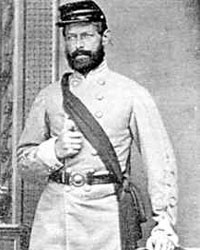Henry Wirz (1822-1865)
Henry Wirz was born in Zurich, Switzerland in 1822. After graduating from the University of Zurich he obtained medical degrees from Paris and Berlin. Wirz emigrated to the United States in 1849 and established a medical practice in Kentucky. After marrying he moved to Louisiana.
 On the outbreak of the American Civil War he joined the Confederate Army. A sergeant in the Louisiana Volunteers, Wirz was badly wounded at the battle at Fair Oaks (May, 1862) and lost the use of his right arm. Unable to continue in active service, Wirz became a clerk at Libby Prison in Richmond. His commanding officer, Brigadier General John Henry Winder, was impressed by Wirz and he was soon promoted to the rank of major.
On the outbreak of the American Civil War he joined the Confederate Army. A sergeant in the Louisiana Volunteers, Wirz was badly wounded at the battle at Fair Oaks (May, 1862) and lost the use of his right arm. Unable to continue in active service, Wirz became a clerk at Libby Prison in Richmond. His commanding officer, Brigadier General John Henry Winder, was impressed by Wirz and he was soon promoted to the rank of major.
Wirz spoke fluent English, German and Dutch, and on the advice of General John Henry Winder, President Jefferson Davis decided to send him on a secret mission to England and France.
When Wirz returned to America he rejoined General John Henry Winder, who was now in charge of all Union Army prisoners east of the Mississippi. During the summer of 1863 an agreement under which Union and Confederate captives were exchanged, came to an end. There was now a rapid increase in the number of prisoners and so it was decided to build Andersonville Prison in Georgia. In April, 1864 Winder appointed Wirz as commandant of this new prison camp.
By August, 1864, there were 32,000 Union Army prisoners in Andersonville. The Confederate authorities did not provide enough food for the prison and men began to die of starvation. The water became polluted and disease was a constant problem. Of the 49,485 prisoners who entered the camp, nearly 13,000 died from disease and malnutrition.
When the Union Army arrived in Andersonville in May, 1865, photographs of the prisoners were taken and the following month they appeared in Harper's Weekly. The photographs caused considerable anger and calls were made for the people responsible to be punished for these crimes. It was eventually decided to charge General Robert Lee, James Seddon, the Secretary of War, and several other Confederate generals and politicians with "conspiring to injure the health and destroy the lives of United States soldiers held as prisoners by the Confederate States".
In August, 1865 President Andrew Johnson ordered that the charges against the Confederate generals and politicians should be dropped. However, he did give his approval for Wirz to be charged with "wanton cruelty". Wirz appeared before a military commission headed by Major General Lew Wallace on 21st August, 1865. During the trial a letter from Wirz was presented that showed that he had complained to his superiors about the shortage of food being provided for the prisoners. However, former inmates at Andersonville testified that Wirz inspected the prison every day and often warned that if any man escaped he would "starve every damn Yankee for it." When Wirz fell ill during the trial Wallace forced to attend and was brought into court on a stretcher.
Wirz was found guilty on 6th November and sentenced to death. He was taken to Washington to be executed in the same yard where those involved in the assassination of Abraham Lincoln had died. Alexander Gardner, the famous photographer, was invited to record the event.
The execution took place on the 10th November. The gallows were surrounded by Union Army soldiers who throughout the procedure chanted "Wirz, remember, Andersonville." Accompanied by a Catholic priest, Wirz refused to make a last minute confession, claiming he was not guilty of committing any crime.
Major Russell read the death warrant and then told Wirz he "deplored this duty."Wirz replied that: "I know what orders are, Major. And I am being hanged for obeying them."
After a black hood was placed over his head, and the noose adjusted, a spring was touched and the trap door opened. However, the drop failed to break his neck and it took him two minutes to die. During this time the soldiers continued to chant: "Wirz, remember, Andersonville."
 On the outbreak of the American Civil War he joined the Confederate Army. A sergeant in the Louisiana Volunteers, Wirz was badly wounded at the battle at Fair Oaks (May, 1862) and lost the use of his right arm. Unable to continue in active service, Wirz became a clerk at Libby Prison in Richmond. His commanding officer, Brigadier General John Henry Winder, was impressed by Wirz and he was soon promoted to the rank of major.
On the outbreak of the American Civil War he joined the Confederate Army. A sergeant in the Louisiana Volunteers, Wirz was badly wounded at the battle at Fair Oaks (May, 1862) and lost the use of his right arm. Unable to continue in active service, Wirz became a clerk at Libby Prison in Richmond. His commanding officer, Brigadier General John Henry Winder, was impressed by Wirz and he was soon promoted to the rank of major.